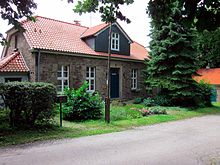Rottberger School
The Rottberger Schule is the building of the former Protestant elementary school of the Rottberg farmers that was in use until 1958 .
Location and description
The district of Rottberg is located on the outskirts of the city of Velbert . The school building stands on a mountain that can be seen from afar between Röbbeck and Hesperbach in the middle of the historic farms of the farmers.
The school consisted of three buildings, which were used as a school house at different times.
In 1777 a half-timbered house was built on Winacker, which, in a greatly modified form, still serves as a residential building today.
In 1840 the school house was supplemented by a stone building. Here was taught until it was closed. This building has also been restored today and used as a residential building.
In 1913 a barrack-like extension was built. During the Second World War it was the construction office of the Krupp night light system . The fictitious train circled Haus Winacker and drove through the school garden. The building from 1913 later served as a youth home and is now also a residential building.
history
In the late Middle Ages and in the early modern period, the Rottberg was the core of a farming community of the same name in the Hardenberg domain . This was lifted in 1808. Until 1929 the Rottberg farmers belonged to the Neviges mayor , and since then to Velbert . The Willinghaus farm on the Rottberg (first mentioned in 890 as Willinghuson) has a Saxon name ending.
Were widespread in Bergisch Land , the "rear and side schools," which by the peasantry were built together and entertained. The farmers gave up a rather unusable piece of land, some oak beams and the clay that was found on the building site. This is how the first school buildings came into being. Until then, lessons were only possible in the church schools in Langenberg and Velbert . That was too far for the children of the remote farmers, who now took their own initiative, against whom the Baron von Hardenberg issued a mandate in 1694. In 1709 and 1722 there were again bans, but without lasting success. The elementary education system in the Bergisches Land was very progressive if you consider that in Prussia the general compulsory schooling was established in 1717 , and only found its conclusion in 1919 in the Weimar constitution . The well-to-do farmers also took turns providing food for the teachers, who complained about their otherwise poor pay. On the remote Rottberg, regular lessons in a half-timbered house on the Winnacker do not begin until 1777. The school chronicle of the neighboring Vossnack School also reports on life in the school on the Rottberg . With the introduction of school buses in 1968, the era of small country schools ended.
literature
- Erich Bohnemann: The Protestant lower school system in the Duchy of Berg. PhD thesis . Wilhelm Dieckmann printing works, Altenkirchen 1925.
- Stefan Gorißen, Horst Sassín, Kurt Wesoly: History of the Bergisches Land. Volume 1, Publishing House for Regional History, Bielefeld 2014, ISBN 978-3-89534-971-3 .
- Dr. Helmut Grau, Josef Johannes Niedworok, Sven Polkläser: Vossnacker school chronicle - two silver groschen for a pupil - 150 local history and a look into the world in the mirror of the Vossnack primary school chronicle . Scala Verlag, Velbert 2015, ISBN 978-3-9816362-3-9 .
Individual evidence
- ↑ Local history in constant rain on: derwesten.de from August 17, 2015
Coordinates: 51 ° 21 '33.4 " N , 7 ° 4' 5.4" E
